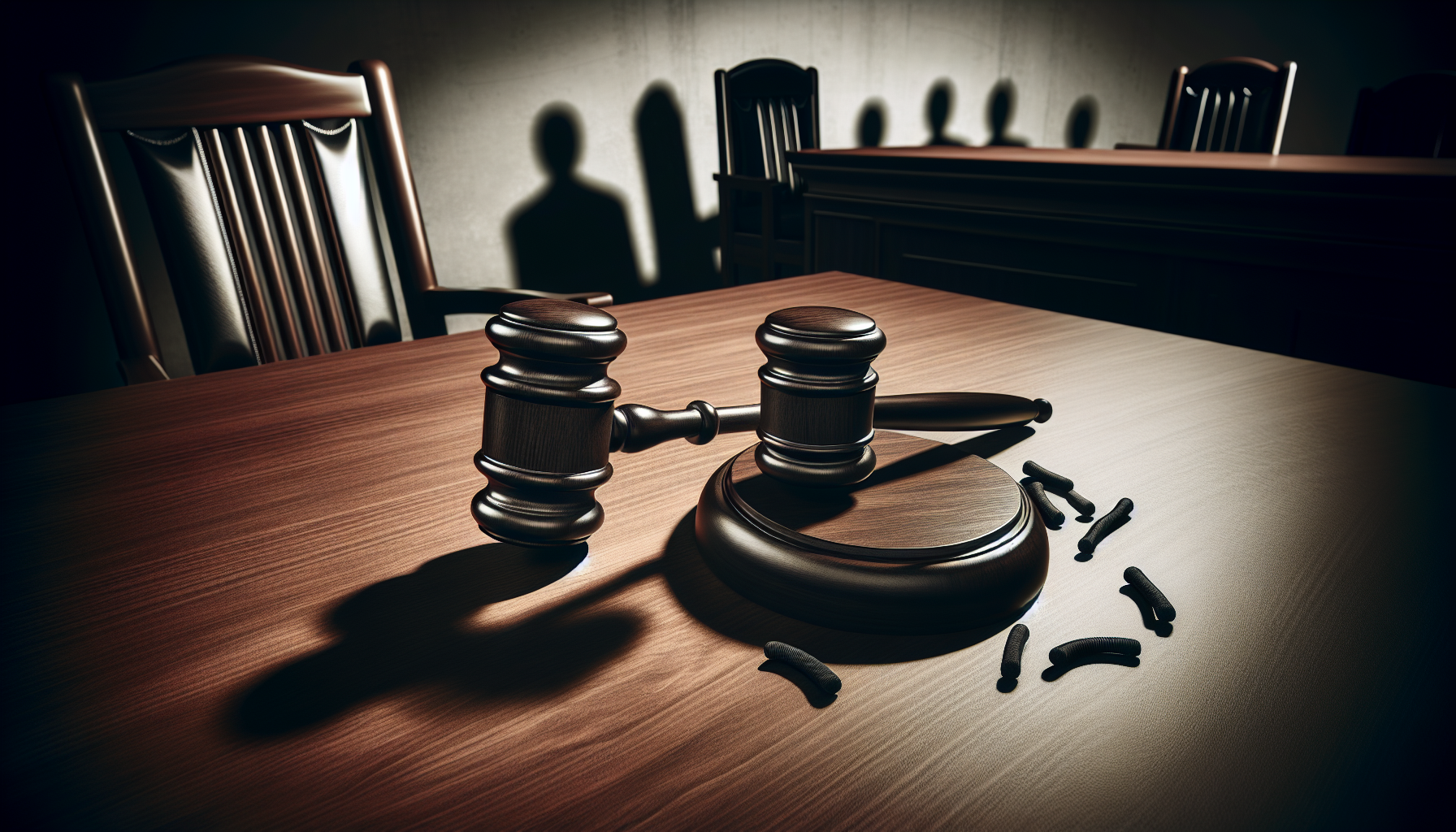Attempting to protect yourself when falsely accused can feel like your world is crashing down. Immediate actions can make a difference. Here, you’ll find crucial steps to take when faced with false accusations and how to navigate the legal and personal challenges that follow.
Key Takeaways
- False accusations can have severe legal, personal, and emotional consequences, including criminal charges, damaged reputation, and significant stress.
- Hiring an experienced criminal defense attorney is crucial for navigating the legal process, protecting your rights, and developing a robust defense strategy.
- Gathering evidence, challenging the accuser’s credibility, and potentially taking legal action against them are essential steps in defending against false accusations and reclaiming your reputation.
Understanding the Consequences of False Accusations

Untrue claims or allegations unsupported by facts, also known as false accusations, can result in severe legal and personal repercussions. When someone is accused of a crime they didn’t commit, the immediate shock can be overwhelming. Legal consequences are often the first concern, as a false accusation can lead to criminal charges, court appearances, and even jail time. This process is time-consuming and financially draining as legal fees and other related costs pile up quickly.
Beyond the courtroom, the damage to one’s reputation can be irreparable. Being falsely accused can tarnish your credibility, making it difficult to secure employment or maintain personal relationships. Even if proven innocent, the stigma of the accusation can linger, casting a shadow over your professional and social life. Employers may hesitate to hire someone accused of a crime, and friends or family members might distance themselves, unsure of the truth. The emotional toll is significant, leading to stress, anxiety, and depression.
Moreover, facing false accusations can have severe emotional and psychological impacts. The accused person often experiences feelings of guilt, shame, and significant distress, even though they are innocent. This emotional turmoil can affect every aspect of their life, from their mental health to their daily interactions. Comprehending these repercussions highlights the need for immediate and effective action to safeguard oneself against false allegations.
Immediate Steps to Take When Falsely Accused
Maintaining calmness is the first and most crucial step when confronting false accusations. Reacting with anger or panic can only make the situation worse and may provide the accuser with additional ammunition to use against you. Staying calm allows you to think clearly and make rational decisions, which is essential in stressful and high-stakes situations.
Subsequently, refrain from speaking to law enforcement officers unless an experienced criminal defense attorney is present. Anything you say can be used against you in court, and without proper legal counsel, you might inadvertently incriminate yourself. Politely but firmly refuse to answer any questions until your attorney arrives. This protects you from making statements that could be misconstrued or used to build a case against you.
Avoid contacting the accuser at all costs. Direct communication can lead to allegations of intimidation or tampering, further complicating your legal situation. If you must address the accuser due to unavoidable circumstances, ensure a neutral third party is present to witness the interaction. This precaution helps prevent false accusations and protects you from further legal complications.
The Importance of Hiring an Experienced Criminal Defense Attorney
Securing an experienced criminal defense attorney is not merely advisable; it’s a requirement. From the moment you are accused of a crime, having a skilled attorney can make all the difference in protecting your rights and building a strong defense. An experienced attorney understands the complexities of the legal system and can guide you through each step of the process, ensuring that you do not make any missteps that could jeopardize your case.
A criminal defense attorney plays a critical role in developing a defense strategy tailored to your unique circumstances. They will thoroughly investigate the facts of the case, challenge the evidence presented by the prosecution, and seek out witnesses who can testify on your behalf. This comprehensive approach is essential in creating reasonable doubt and demonstrating your innocence.
Moreover, an experienced attorney can help manage public perception and protect your reputation throughout the legal proceedings. They can advise you on handling media inquiries, guide you in maintaining a low profile, and work to ensure that your story is heard. By hiring a competent criminal defense lawyer for your legal representation, you are taking a significant step toward safeguarding your future and achieving a favorable outcome.
Gathering Evidence to Support Your Innocence
To defend yourself against false accusations, it is crucial to gather evidence. Documentation such as emails, text messages, and receipts can establish an alibi and refute the claims made against you. This evidence can demonstrate that you were elsewhere or engaged in different activities when the alleged incident occurred, thereby proving your innocence.
Screenshots of social media posts related to the case should also be preserved. Social media can be a treasure trove of information, and posts made by the accuser or witnesses can often reveal inconsistencies or outright falsehoods in their statements. Ensuring you have this digital evidence can be pivotal in your defense strategy.
Witness statements are another powerful tool in proving your innocence. Identifying and interviewing potential witnesses who can corroborate your version of events is essential. These witnesses can testify to your whereabouts during the alleged incident or provide information about the accuser’s motives or behavior.
Keeping meticulous records of all interactions and communications with the accuser can further bolster your case and help defend your reputation.
Challenging the Credibility of the Accuser
A significant aspect of your defense strategy is to challenge the credibility of your accuser. One effective method is to place the accuser under oath and question them about their motives and history. This can reveal inconsistencies in their story and expose any potential biases or ulterior motives they may have.
If the accuser has a motive, such as gaining custody of children or retaliating out of anger, this can be used to question their reliability. When interviewing the accuser, a defense attorney will ask targeted questions to doubt their credibility in the eyes of judges and juries. This is a common strategy used to challenge the reliability of the accuser’s testimony. These questions can include:
- Are there any inconsistencies in the accuser’s story?
- Have they made false accusations in the past?
- Are there any witnesses who can corroborate or contradict their claims?
- Have they ever been convicted of a crime themselves?
- Are there any other possible explanations for their allegations?
By asking these questions, the defense attorney can highlight discrepancies in the accuser’s testimony and doubt their overall credibility.
By meticulously preparing for these cross-examinations, your defense attorney can expose the weaknesses in the accuser’s case and demonstrate that their allegations are untrustworthy. This approach can significantly undermine the prosecution’s case and support your claim of innocence.
Developing a Strong Defense Strategy

Developing a robust defense strategy is essential to navigate through false accusations successfully. The first step is to be completely honest with your attorney about all the facts, including any potential weaknesses in your case. This openness allows your attorney to craft a defense strategy that addresses all aspects of the case and anticipates the prosecution’s arguments.
A skilled criminal defense attorney will review the case facts and circumstances to develop a case theory most likely to succeed. This might involve:
- Exposing legal flaws in the prosecution’s case
- Presenting an alibi
- Calling witnesses to testify to evidence showing your innocence
- Demonstrating the absence of criminal intent
These elements can be powerful in your defense.
Moreover, establishing an alibi can be one of the most compelling strategies. You can create reasonable doubt about your involvement by proving that you were elsewhere during the alleged crime. A robust defense strategy combines these elements to present a comprehensive and convincing case that supports your innocence.
Legal Actions Against False Accusers
Legal action against the false accusers could be a feasible choice for those seeking justice and reparation. Defamation, including libel (written false statements) and slander (spoken false statements), can be grounds for a lawsuit if the false accusations have damaged your reputation. To succeed in a defamation case, you must prove that the statement was false, made to a third party, and resulted in harm.
Malicious prosecution is another legal avenue that can be pursued. This involves filing a lawsuit against the accuser for initiating a criminal or civil case against you without probable cause and with malicious intent. You must demonstrate that the case was resolved in your favor and that the accuser acted maliciously.
You can also press charges against someone for making a false police report. This can lead to criminal penalties for the accuser, providing a sense of justice and potentially deterring others from making false accusations. By pursuing these legal actions, you can hold the false accuser accountable and seek reparation for damage to your reputation and life.
Seeking Compensation for Damages
False accusations can result in considerable financial and emotional harm, thereby making it necessary to seek compensation for these damages. Malicious prosecution claims can result in compensation for the costs associated with defending the charges, lost wages, and emotional distress. These claims acknowledge the financial burden and emotional toll that false accusations can impose.
In defamation cases, punitive damages may be awarded for the emotional and financial harm caused by the false statements. This includes compensation for lost business opportunities, lost earning power, and medical bills related to the stress and anxiety caused by the accusations. Seeking monetary compensation can help mitigate the impact of the false accusations and provide financial relief during a difficult time.
Overall, pursuing compensation for damages helps address the financial and emotional harm caused by false accusations and serves as a form of justice. By holding the accuser accountable, you can work towards restoring your reputation and reclaiming your life.
Protecting Your Reputation
A strategic approach is required to protect your reputation after being falsely accused. First and foremost, remain calm and avoid rash or angry reactions. Emotional outbursts can be used against you and further damage your reputation. Instead, focus on maintaining a composed and rational demeanor.
Managing your online presence is equally important. Be cautious about what you post on social media, as anything you share can be scrutinized and used against you. Avoid discussing the case publicly and avoid making any statements that could be misinterpreted. Protecting your digital footprint can help prevent additional harm to your reputation.
By taking these steps, you can minimize the impact of false accusations on your reputation and maintain your integrity. Staying calm and managing your online presence are crucial in protecting your public image and ensuring that others view you fairly.
Staying Informed About Your Legal Rights
When confronting false accusations, staying informed about your legal rights is crucial. Knowing your rights can prevent false confessions, as law enforcement may pressure you to waive your right to remain silent. Understanding these rights empowers you to make informed decisions and protect yourself throughout the legal process.
Defendants are not required to prove their innocence but must show reasonable doubt about the allegations, ensuring they are not proven guilty. Staying informed ensures you can assert your rights and navigate the legal system effectively. By understanding your legal rights, you can better protect yourself and work towards a favorable outcome in your case.
Summary
Facing false accusations is a challenging and stressful experience, but understanding the steps to protect yourself can make a significant difference. From remaining calm and hiring an experienced criminal defense attorney to gathering evidence and challenging the accuser’s credibility, each step plays a crucial role in defending your innocence. Taking legal action against false accusers and seeking compensation for damages can also help restore your reputation and provide a sense of justice.
In conclusion, staying informed about your legal rights and proactively defending yourself is essential when dealing with false accusations. Following the advice outlined in this guide, you can navigate this complex situation more effectively and work towards clearing your name. Remember, you are presumed innocent until proven guilty, and taking the right steps can help you achieve a favorable outcome.
Frequently Asked Questions
What should I do immediately after being falsely accused?
Remain calm, avoid contacting the accuser, and do not speak to law enforcement without an experienced criminal defense attorney present. Take these steps to protect your rights and ensure a fair resolution.
How can an experienced criminal defense attorney help me?
An experienced criminal defense attorney can help by protecting your rights, developing a strong defense strategy, and guiding you through the legal process. They can also challenge evidence on your behalf.
What types of evidence should I gather to prove my innocence?
Gather documentation such as emails, text messages, receipts, screenshots of social media posts, and witness statements to corroborate your alibi and refute false accusations. This evidence will help prove your innocence.
Can I take legal action against someone who falsely accused me?
Yes, you can take legal action against someone who falsely accused you by suing for defamation or pressing charges for making a false police report if the accusations have harmed your reputation and life.
How can I protect my reputation after being falsely accused?
To protect your reputation after being falsely accused, remain calm, manage your online presence, and avoid discussing the case publicly to prevent further damage.




